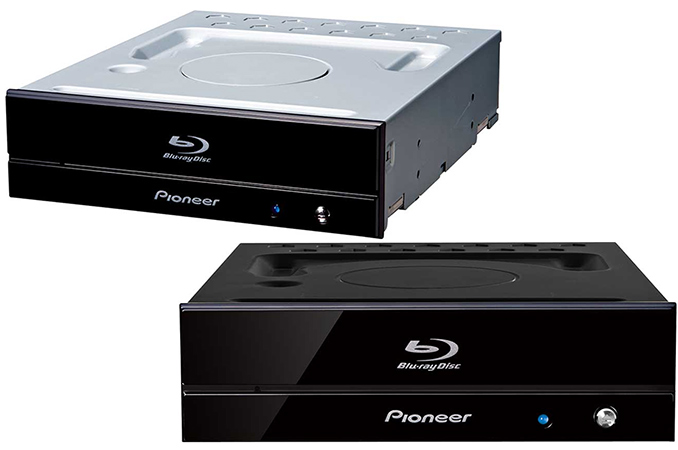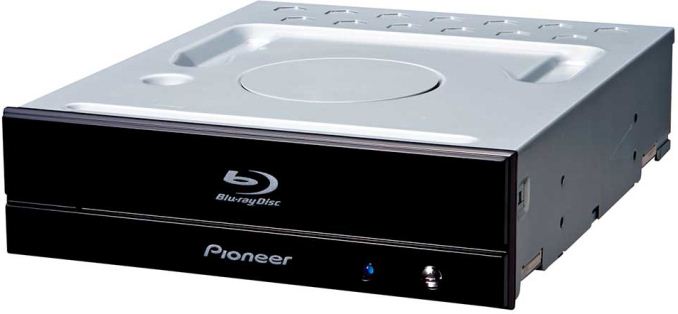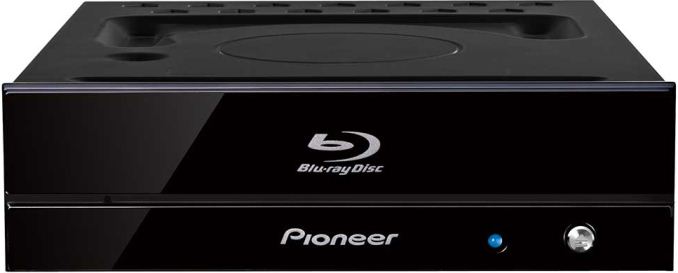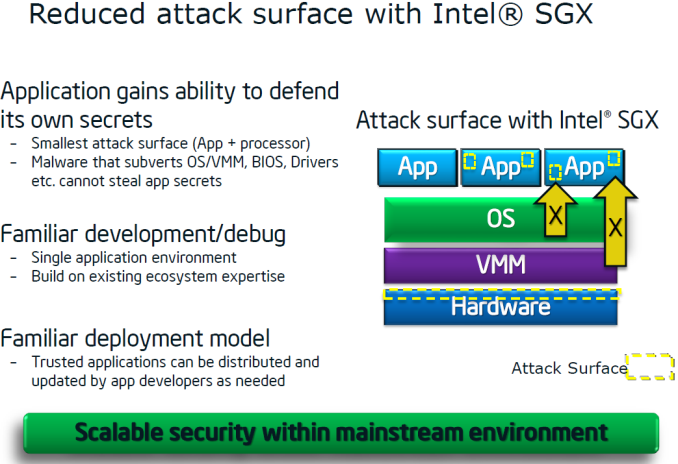Pioneer Announces Ultra HD Blu-ray Supporting BDR-S11J Drives
by Anton Shilov on January 26, 2017 4:25 AM EST- Posted in
- Optical Media
- 4K
- UHD
- ODDs
- Pioneer
- Ultra HD Blu-ray

Pioneer has announced its first Blu-ray disc burners that officially support playback of Ultra HD Blu-ray discs. The drives will be Pioneer’s top-of-the-range ODDs and will thus support all the latest technologies from the company, but it is important to note that Ultra HD Blu-ray discs have a number of specific requirements and despite formal support for the latest media format, the drives will not transform any PC into a UHD BD player alone due to the numerous requirements (something that system integrators will have to ensure).
The New Drives
The Pioneer BDR-S11J-BK and the BDR-S11J-X are advanced optical disc drives in a 5.25” form-factor with the SATA 3.0 interface capable of reading and recording CD (CD, CD-R, CD-RW), DVD (DVD, DVD±R, DVD±R DL, DVD±RW, DVD-RAM) and Blu-ray (BD, BD-R SL/DL/TL/QL, BD-RE SL/DL/TL, BD-R LTH) discs. The drives have 4 MB buffer underrun protection (which is in line with other higher-end ODDs from competitors) and support 16x burning speed for BD-R SL (25 GB) media. Meanwhile, writing capabilities are not the key feature of the new ODDs. Pioneer advertises improved CD audio playback as well as support for Ultra HD Blu-ray discs as the key selling points of the new drives by way of updated technologies.
Usage of optical discs has been declining in the recent years, but those people who still use ODDs tend to demand features like fine reading/playback of scratched discs in general and audio CDs in particular (simply because they have large collections of appropriate media). To appeal to these people, the Pioneer BDR-S11J-BK and the BDR-S11J-X support the PureRead 4+ and Real Time PureRead functions specifically tailored to improve reading performance of scratched audio CDs. In addition, the more expensive BDR-S11J-X has further enhancements to improve playback quality of inserted audio CDs. Pioneer does not reveal too many details other than saying about finely tuned internal components (possibly to minimize vibration) as well as a feature called the “playback quality check.”
Another important capability of the Pioneer BDR-S11J-BK and the BDR-S11J-X ODDs is guaranteed support for Ultra HD Blu-ray discs. Technically speaking, to read a 100 GB Ultra HD Blu-ray disc, an ODD must support triple-layer Blu-ray disc with 33 GB layers and up to 128 Mbps data rate (i.e., 4x read speed). Therefore, any BDXL-supporting BD ODD has technical capabilities to read UHD BDs. However, not everything is that simple.
New Requirements for Ultra HD Blu-ray Video Playback
Meanwhile, to actually playback an Ultra HD Blu-ray disc, users will need:
- A PC that supports AACS 2.0 and Intel Software Guard Extensions (SGX)
- An appropriate optical disk drive,
- Software that handles UHD BD playback,
- Windows 10,
- A GPU that has an HDMI 2.0a output with HDCP 2.2 (and AACS2 supported by its driver, which eliminates current-gen standalone GPUs) and,
- A 4K TV/display that has an HDMI 2.0a input with HDCP 2.2.
While there are graphics adapters that support HDCP 2.2, as well as displays that also support it, at the time of writing there are no software packages that support playback of Ultra HD Blu-ray discs. CyberLink last year promised to update its PowerDVD 16 Ultra to support UHD BDs, but so far, this feature has not been formally added to the player. Now, while many contemporary BDXL-supporting ODDs can read Ultra HD Blu-ray discs (and allow users to browse files or write to them), manufacturers tend not to declare UHD BD playback support by their products. While it is possible that this is a software limitation, it is also possible that the limitation is hardware and currently available optical drives miss an important piece or two required to playback UHD BD movies even once appropriate software is available and they are installed into qualifying PCs. That said, Pioneer is currently the only ODD supplier that formally declares support for UHD BDs, at least in terms of files.
Apart from the ODD, the GPU (and its driver), the display, and the playback software, AACS 2.0 support seems to be a major concern. Its implementation on the PC is different from other consumer electronics, according to CyberLink. In a bid not to let AACS 2.0 encryption keys leak (as it happened in the past to the original AACS), AACS LA demands to handle their decryption in a secure hardware environment. To create secured private regions of memory that cannot be accessed by third-party applications (to prevent access to AACS2 keys), software developers have to use Intel’s Software Guard Extensions (SGX) instructions, whereas end users have to use platforms featuring the technology. Intel’s SGX has to be supported by the CPU, the OS and the application, but one of the problems is that not all modern processors support it. Intel first incorporated SGX into its Skylake CPUs in 2015, but not all of such chips support the tech: for example, some of the early higher-end processors have it disabled. Moreover, SGX has to be supported by motherboard’s BIOS and at present Pioneer recommends Intel 200-series based platforms (note that this does not mean that every Intel 200-series mainboard supports SGX). It is also important to note that not every Intel 200-series motherboard/system supports HDCP 2.2, which is required if the integrated is used. In fact, in the latter case Pioneer says that Intel’s HD Graphics 630 or more advanced is required, which eliminates low-power CPUs.
One of the peculiarities of playback via AACS2 is that it has to be supported by the whole system, not just certain critical components. This may not be a big problem for consumer electronics (even though it has its peculiarities there as well, for example, a requirement to pair a drive with its host that binds them at time of manufacture that will make lives of people who rip disks harder, but will also make it impossible to replace a failed ODD in a player), but for PCs things are going to get considerably more complicated. The content has to be encrypted using AACS2 throughout the whole data transfer from the optical disc to the decoder (i.e., the GPU for a PC) and then decoded in a secure environment. Since AACS2 mandates the use of secure environment at all times, decryption of Ultra HD Blu-ray content in a PC is now possible only on an iGPU that uses system memory with appropriate regions set aside for this particular task. Unless companies like AMD and NVIDIA invent their own SGX-like technology or manage to support Intel’s extensions in their drivers and by their discrete hardware, it will not be possible to use standalone GPUs for Ultra HD Blu-ray playback despite all their advanced media decoding capabilities. Quite naturally, this leaves systems based on Intel’s multi-core Core i7 HEDT processors without Ultra HD Blu-ray encoded playback content, but that is a price that PCs have to pay for AACS2.
Pioneer will bundle various programs with the BDR-S11J-BK and the BDR-S11J-X ODDs, including CyberLink’s PowerDVD 14 (not quite new), PowerDirector 14, PowerProducer 5.5, Power 2 Go 8, InstantBurn 5 and so on. The manufacturer did not reveal the official price of the new drives, but PC Watch reports that the BDR-S11J-BK and BDR-S11J-X will be priced at ¥22,000 ($193) and ¥35,000 yen ($307) respectively when they are available in Japan in late February.













64 Comments
View All Comments
takeshi7 - Thursday, January 26, 2017 - link
I just want Sony to bring back MiniDiscs. They're still the coolest optical media ever invented.halcyon - Thursday, January 26, 2017 - link
Finally a new BD-R BDXL burner. I still back up lots of media creation files to BD-R DL (and perhaps in future to BDXL, if the price of discs drops). There is nothing else there that has the same cost/data ratio for off-line storage. No, HDs don't do it. No, USB-sticks don't do it. Perhaps in the future 1TB SSD drives or something similar, but we are not there yet.CaedenV - Thursday, January 26, 2017 - link
Dear Hollywood morons,Please step back and look at what you are doing.
You are spending billions of dollars on DRM, and every time pirates figure out ways around it. Heck, now they just play discs back on TVs and capture it with a high-end camera, and no amount of DRM is about to stop that from happening.
Meanwhile, people like myself have a problem. All we want to do is have a digital library that we can play back on any device at any time. Sure, apps like Netflix and Hulu are broadly available... but their quality is 'less than desirable' to begin with, and ISPs are at war with them and constantly making matters worse. I have very nice computers hooked up to 4K TVs (looking at HDR tvs in the next year or so now that Win10 supports it), and very nice laptops and tablets with amazing displays on them. And yes, I could hook up a standard blu-ray player on my TVs, put in a disc, and watch content at full quality... problem is; this isn't the 1990s any more! I don't want to worry about if the kids scuffed up a disc, or someone put the disc in the wrong case, or mess with constantly trying to alphabetize my collection, or standing in front of the shelf akwardly trying to read sideways text in weird fonts, or switching inputs between my PC or some antiquated video player for different kinds of content. I want to come home, plant my butt on the couch, find what I was watching easily, hit play, and have a full-quality experience.
Seems to me, we could meet in the middle. You guys don't want to waste money on useless DRM, and I dont want to keep buying physical media. How about you take your nice beautiful content, package it in a MKV, and sell it to me for the same $15-30 a disc costs? I get the product I want, you get the price you want, and both of us can spend a lot less time faffing about with the DRM in the middle.
It could be the start of something beautiful!
Sincerely,
A Movie and TV fan
maglito - Thursday, January 26, 2017 - link
And to make them "happy" each download is a unique re-encode of the audio/video stream which contains a unique identifier to the original purchaser. So, if the content is "shared" they can go back and prosecute the violator.I would be fine with such a solution.
zodiacfml - Friday, January 27, 2017 - link
Unbelievable pain. This is unreasonable for paying users.Wolfpup - Friday, January 27, 2017 - link
Ugh, I wish this was straight forward. What a mess. Basically only some low end super new PCs can support it, and then only with a ton of screwy software running.I think I'll end up just sticking an Xbox One by my PC...
lolipopman - Saturday, January 28, 2017 - link
About time.Magichands8 - Saturday, January 28, 2017 - link
Just as it was with Bluray, I have absolutely no interest in this or in UHD until the DRM is cracked and the content can be played on MPC-HC. And at that point, just like with Blurays, I'll start buying the discs.Golgatha777 - Tuesday, January 31, 2017 - link
Sadly, it will be cheaper and will save one many headaches in the long run to add an XBox One with HDMI passthrough to your PC monitor, than it will be to invest in all the new hardware, software, and configuration headaches required to get this draconian DRM working on any PC.fanofanand - Tuesday, January 31, 2017 - link
This is insanity. It really does seem like they have a vested interest in ensuring UHD Blu-Ray doesn't take off.